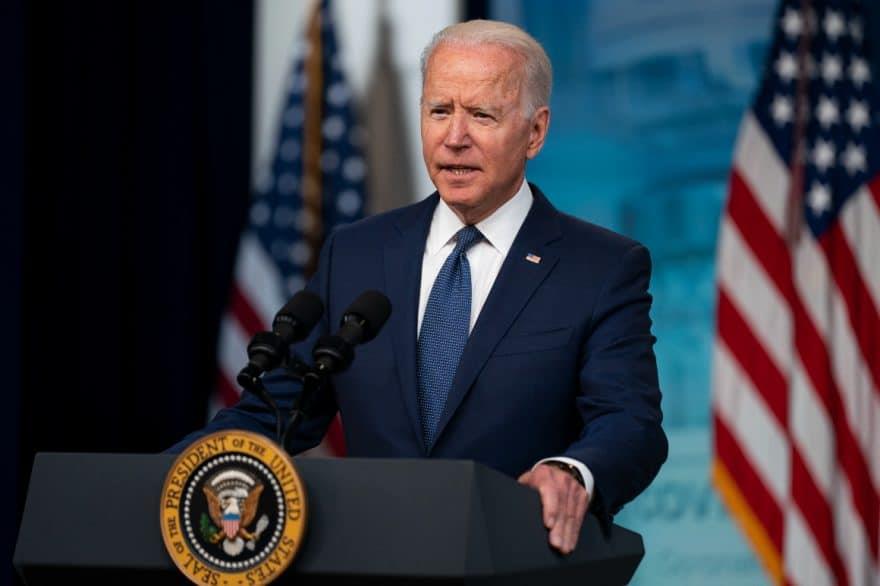
Biden's IPEF And A Rough Indo-Pacific
By: Ayanangsha Maitra
Ayanangsha Maitra is a regular Khaama Press Contributer from India and journalist with The New Indian
President Joe Biden of the US launched his flagship initiative Indo-Pacific Economic Framework for Prosperity from Tokyo on May 23, just a day ahead of the Quad summit in the Japanese capital. The foundations of the IPEF are trade, supply chains, clean energy, decarbonization and infrastructure and tax and anti-corruption to counter China's imperialistic attitude in the region. The Indo-Pacific region is vast as it brackets a large geography, right from East Africa to the west coast of the US. Half of the total maritime trade of the world commences through the Indo-Pacific region. All together the member nations of the IPEF contribute 40 percent of global GDP.
President Joe Biden of the US launched the IPEF along with the leaders of the twelve other nations of the Indo-Pacific region, Australia, Brunei, India, Indonesia, Japan, Republic of Korea, Malaysia, New Zealand, Philippines, Singapore, Thailand, and Vietnam in Tokyo. In addition to President Joe Biden and Prime Minister Fumio Kishida of Japan, Indian Prime Minister Narendra Modi attended the lunch in person, while cabinet-level representatives from 10 other countries attended lunch of IPED virtually. India has advocated for keeping the block open for membership. The recent inclusion of Fiji in the IPEF has shown the prospect and nature of expansion of the block.
The Biden administration revealed the plan of coming out of such an initiative in October 2021.
Washington then explored the opportunity further and later they confirmed the launch of IPEF in this year.
The IPEF is committed to promote sustainability, inclusiveness, economic growth, fairness, and competitiveness for the members. Lucrative trading opportunity is one of the main attractions for joining the block, wherein digital economy and digital trade will have special space. In a joint statement, the White House said,”We seek to build high-standard, inclusive, free, and fair trade commitments and develop new and creative approaches in trade and technology policy that advance a broad set of objectives that fuels economic activity and investment, promotes sustainable and inclusive economic growth, and benefits workers and consumers. Our efforts include, but are not limited to, cooperation in the digital economy.“
At a time, when the US firms are finding an alternative destination of China for manufacturing products, the IPEF members may tap the opportunity of hosting them in their territory. But however there is no clarity yet, whether the American firms will choose IPEF states for shifting their facilities from China.
Despite there being several ASEAN members in the IPEF, Cambodia, Laos, and Myanmar, the trio has refrained from joining the IPEF. The FDI between China and ASEAN states has grown tremendously over the decade. Containing China hence is not easy for IPEF.
President Donald Trump walked out of the Trans-Pacific Partnership (TPP), the largest trading association in the region in 2017. He emphasized Free and Open Indo-Pacific strategy. After the exit of the US from the TPP, the chance of countering China's influence in the Indo-Pacific region has become slim, according to a study by an US based organization.
Speaking from Japan on the launch of IPEF, Prime Minister Narendra Modi asserted that formation of “IPEF is a declaration of a collective desire to make the Indo-Pacific region an engine of global economic growth.”
In the Post-pandemic century, this bloc will help India create a resilient supply chain. Prime Minister Narendra Modi said that the foundation of resilient supply chains must be 3T's – Trust, Transparency and Timeliness. While in Tokyo at the launch of IPEF, PM Modi urged the member states to find common and creative solutions to tackle economic challenges of the Indo-Pacific region.
IPEF is a sharp weapon of Washington DC to counter China's rapid influence in the region. But Washington needs to consolidate the idea of the bloc and ensure that IPEF benefits all the members, especially the emerging economies. The IPEF should graduate from the position to be more credible and more acceptable to the emerging economies. It's understood that IPEF can't guarantee a Free Trade Agreement among the members but the forum should keep trade free from obstacles, especially narrow domestic interests of the dominant actor.

Legal Disclaimer:
MENAFN provides the
information “as is” without warranty of any kind. We do not accept
any responsibility or liability for the accuracy, content, images,
videos, licenses, completeness, legality, or reliability of the information
contained in this article. If you have any complaints or copyright
issues related to this article, kindly contact the provider above.


















Comments
No comment